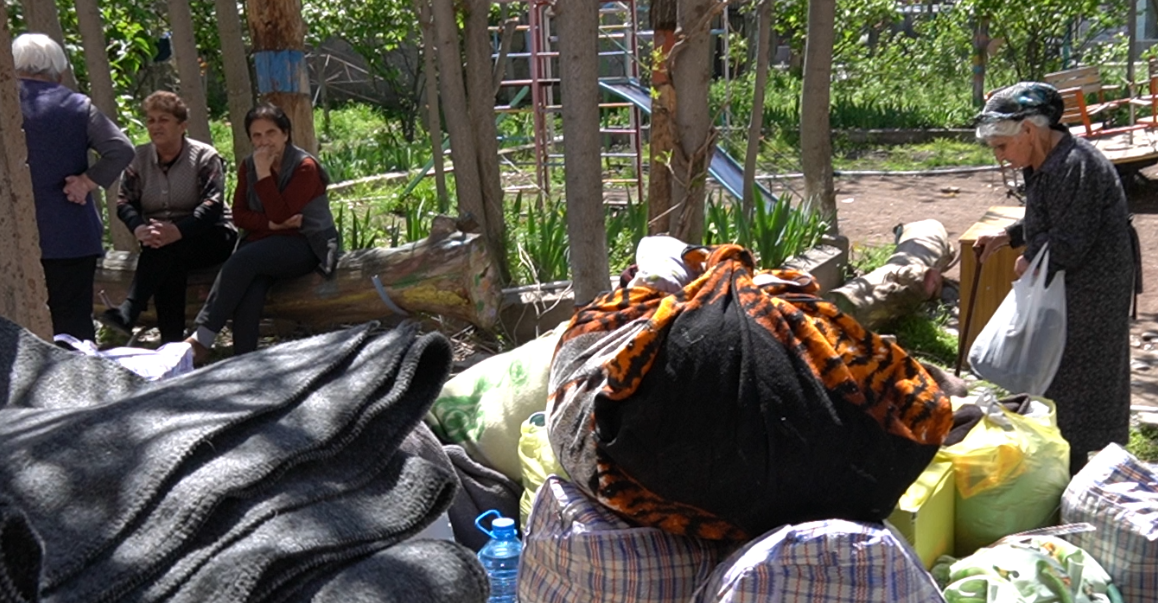Karabakh refugees worry about survival after social support was cancelled in Armenia
Some Karabakh residents cannot obtain social assistance because they had left for Armenia before the mass exodus of refugees, the Council for the Protection of the Rights of Citizens of Nagorno-Karabakh has reported. Most refugees are worried about the possibility of being left homeless after the payments are cancelled.
Every day, "almost 30 refugees come or call" the above Council, Diana Oganyan, a member thereof, told the "Caucasian Knot" correspondent. "They approach us mainly with their social problems. These are people who had left Artsakh (the self-name of Nagorno-Karabakh, – note of the "Caucasian Knot") before the blockade due to illnesses, or were taken out by the Red Cross during the blockade, and receive no social assistance under the state programme, since they were not registered upon entry to Armenia during the mass exodus in late September 2023. The Ministry of Social Affairs refuses them, even though these people possess no real estate; they have no work and have health problems, arguing that the government's decision only applies to those who got registered upon entry. According to the same ministry, there are about 7000 such people. There are also people who actually left Artsakh in September 2023, but they are not in the database," Ms Oganyan has explained, adding that the issue of receiving social assistance for the category of people and families who became victims of the explosion of the fuel depot on September 25, 2023, is very acute."
"People were there out of need and due to the fuel shortage that arose during the blockade. Families lost their breadwinners or family members; or the breadwinner was so injured by the fire that he is incapacitated. The Armenian government refuses to grant social status to these families. They fail to take into account that there was martial law in Artsakh, that these are mainly the breadwinners of their families," Diana Oganyan has noted.
The support extending for two months won’t solve the problem. The Council should take this into account and think about further struggle.
Regarding the adoption of Armenian citizenship, she has added that Karabakh refugees generally do not want to become Armenian citizens, since they hope to return to their homes, and, therefore, want to preserve their passports with the 070 code.
"Since there is a categorical statement of the Armenian government that they will not make concessions on this issue, we proposed that this point be removed from the housing programme for Karabakh refugees and a new condition be included: if a family purchases housing and after 10 years of residence wants to privatize it, then they will be allowed to do so only after accepting Armenian citizenship," Ms Oganyan has stated.
Apres Margaryan, another member of the above Council, treats the fact that people are turning to them with their problems as the first positive result of the Council's work.
"Unfortunately, we have no opportunities to solve these problems, but we can bring them to the Armenian Govt. <...> our further steps depend on people’s reactions and opinions – whether the Council will continue working or not," the activist has added.
Arthur Stepanyan, a refugee from Nagorno-Karabakh, is concerned about what will happen to the families who have no high-paying jobs after the social assistance in the amount of 40,000 drams ends. According to his story, the Council failed to answer his question, but said that “this problem worries thousands of refugee families; and they will present the problem to the government.”
It is impossible for families of one to three members to buy an apartment for the provided certificate; while the support of 40,000 drams is only 50% of the rental fee, Elen Minasyan told the "Caucasian Knot" correspondent.
"I suggested that in addition to the certificate, in the case of purchasing an apartment in the secondary market, small families should be given a chance to take advantage of the income tax refund on the withdrawn amount, at least for the first few years," the young woman has noted.
The so-called certificates, issued to internally displaced persons (IDPs) to purchase an apartment are in fact insufficient for purchasing housing, Eduard Petrosyan, a refugee, believes. "It is necessary to add a clause to the requirement that the Armenian government oblige banks to provide IDPs from Artsakh with preferential, for example, interest-free, state-subsidized loans," he told the "Caucasian Knot" correspondent.
Anaida Pogosyan from Nagorno-Karabakh has noted that it is necessary "to continue the fight so that social financial assistance to refugees continues until they purchase housing, otherwise in two months, several thousand families will end up in the street."
Naira Alakhverdyan, 55, a refugee, also believes that "support in the amount of 40 + 10 or 40,000 drams should be provided until they purchase housing."
"The support extending for two months won’t solve the problem. The Council should take this into account and think about further struggle. My entourage is ready to support any Council’s initiative aimed at preserving the social support. "It is also important for me that we are not forced to change our passports," Ms Alakhverdyan told the "Caucasian Knot" correspondent.
This was originally published on the Russian page of 24/7 Internet agency ‘Caucasian Knot’ on May 24, 2025 at 06:56 pm MSK. To access the full text of the article, click here.
Source: CK correspondent

